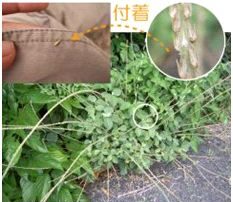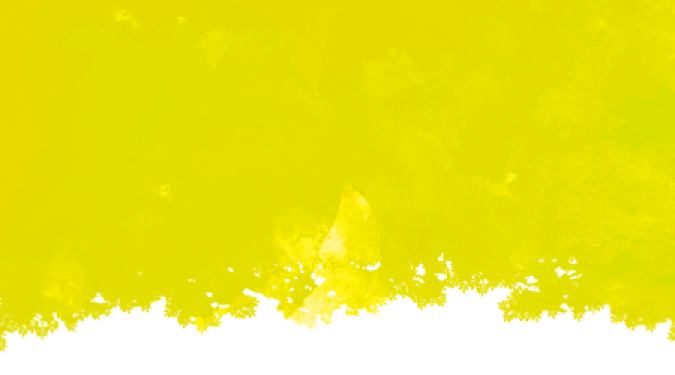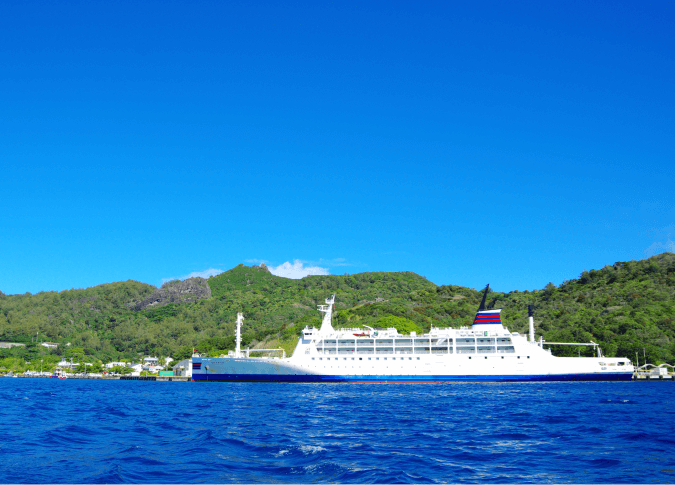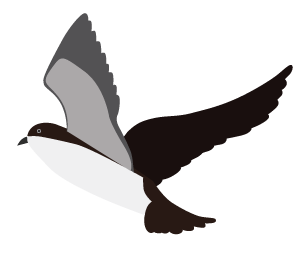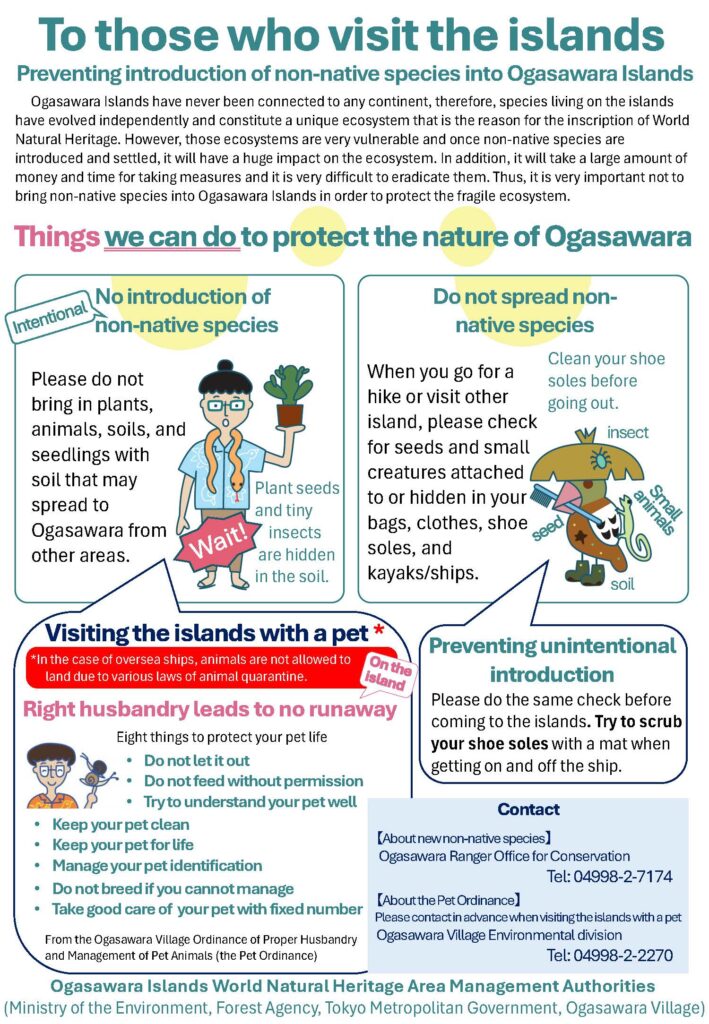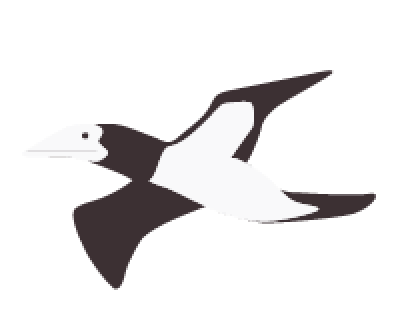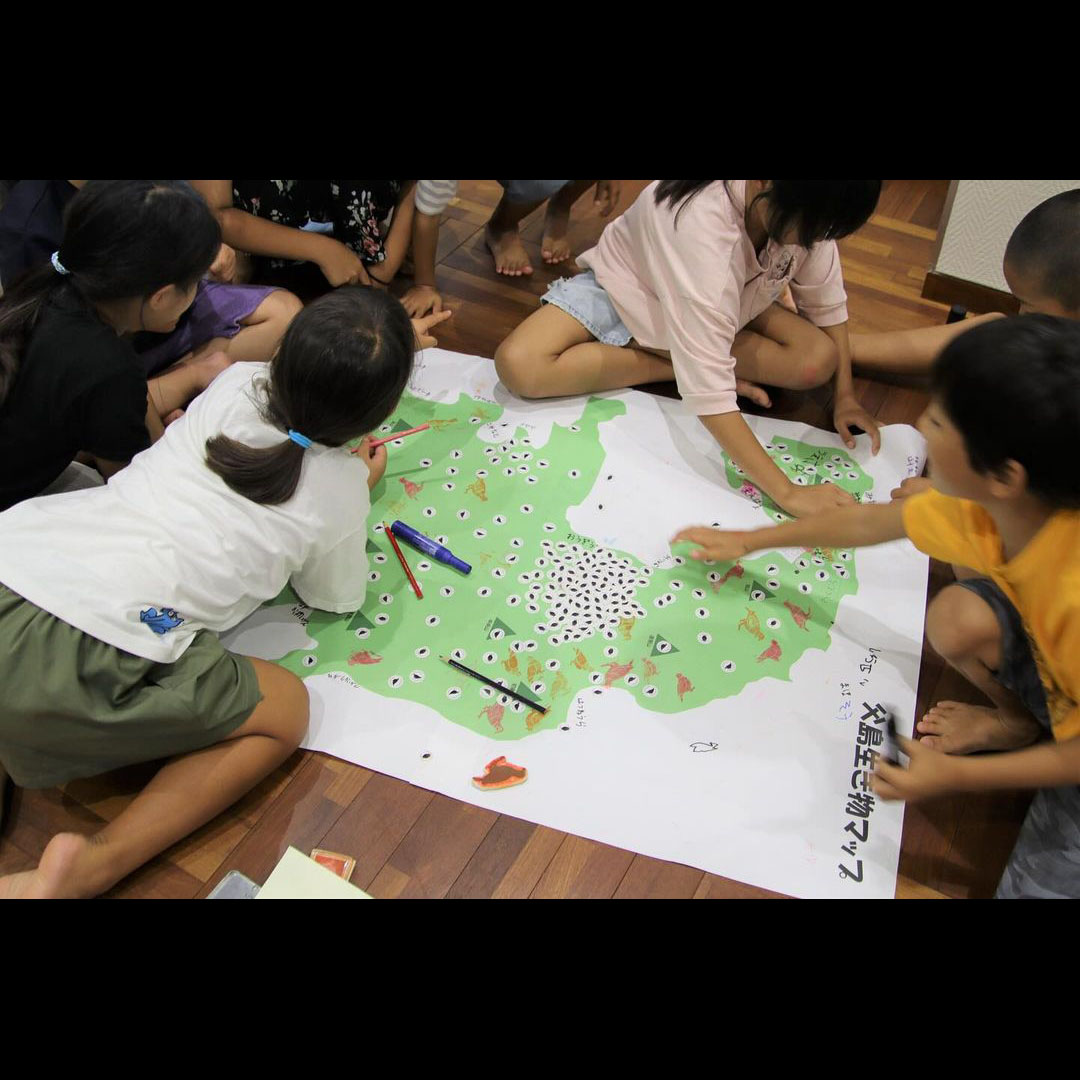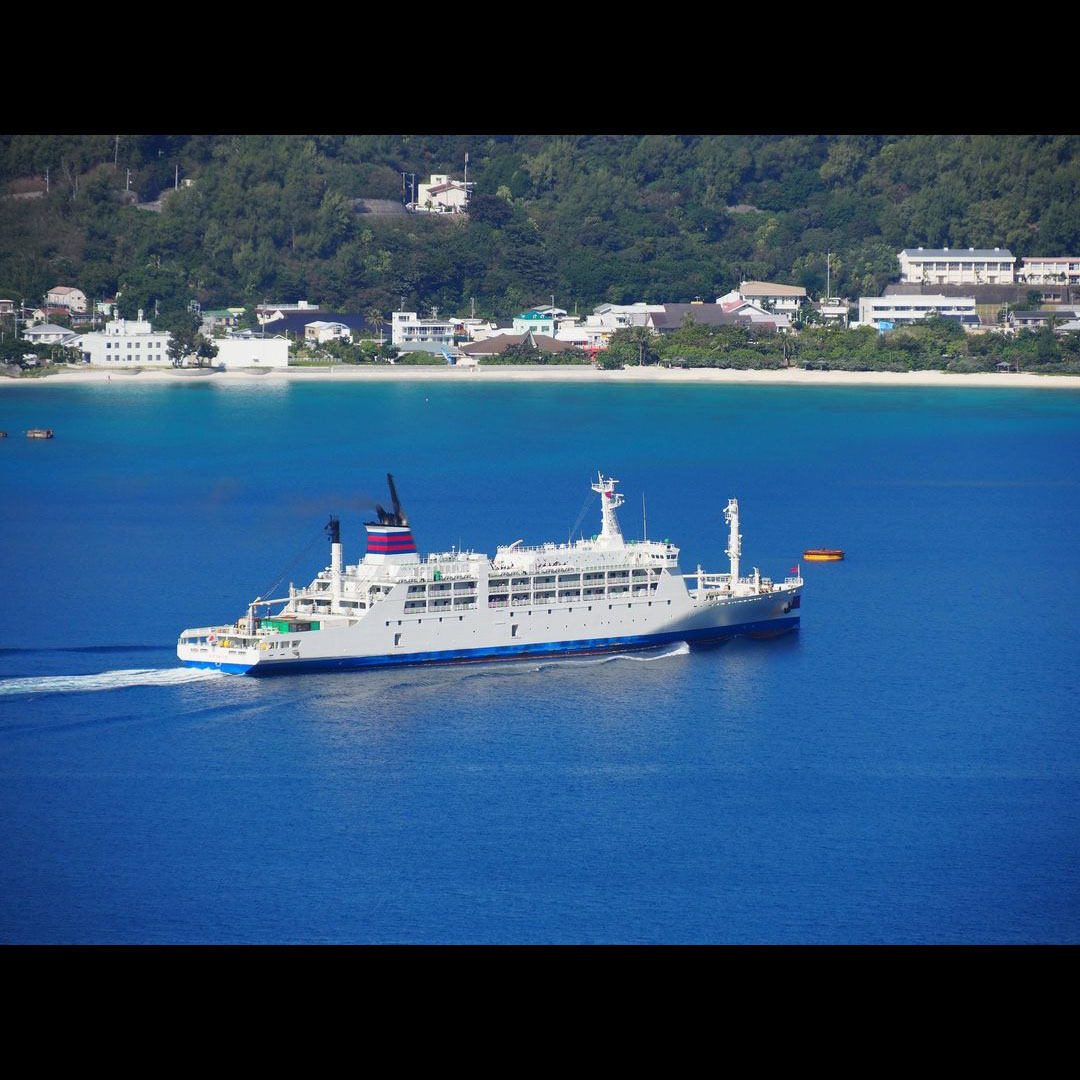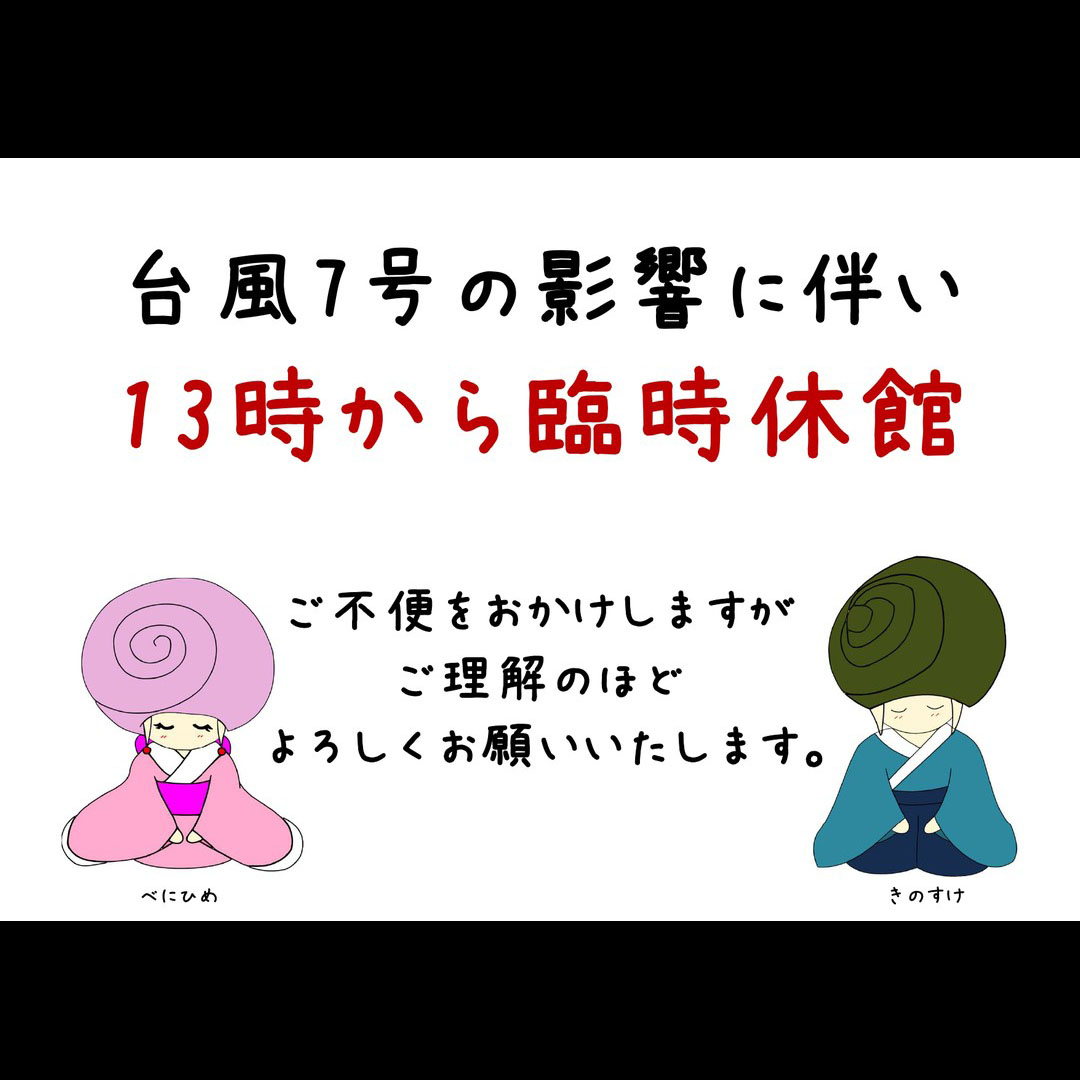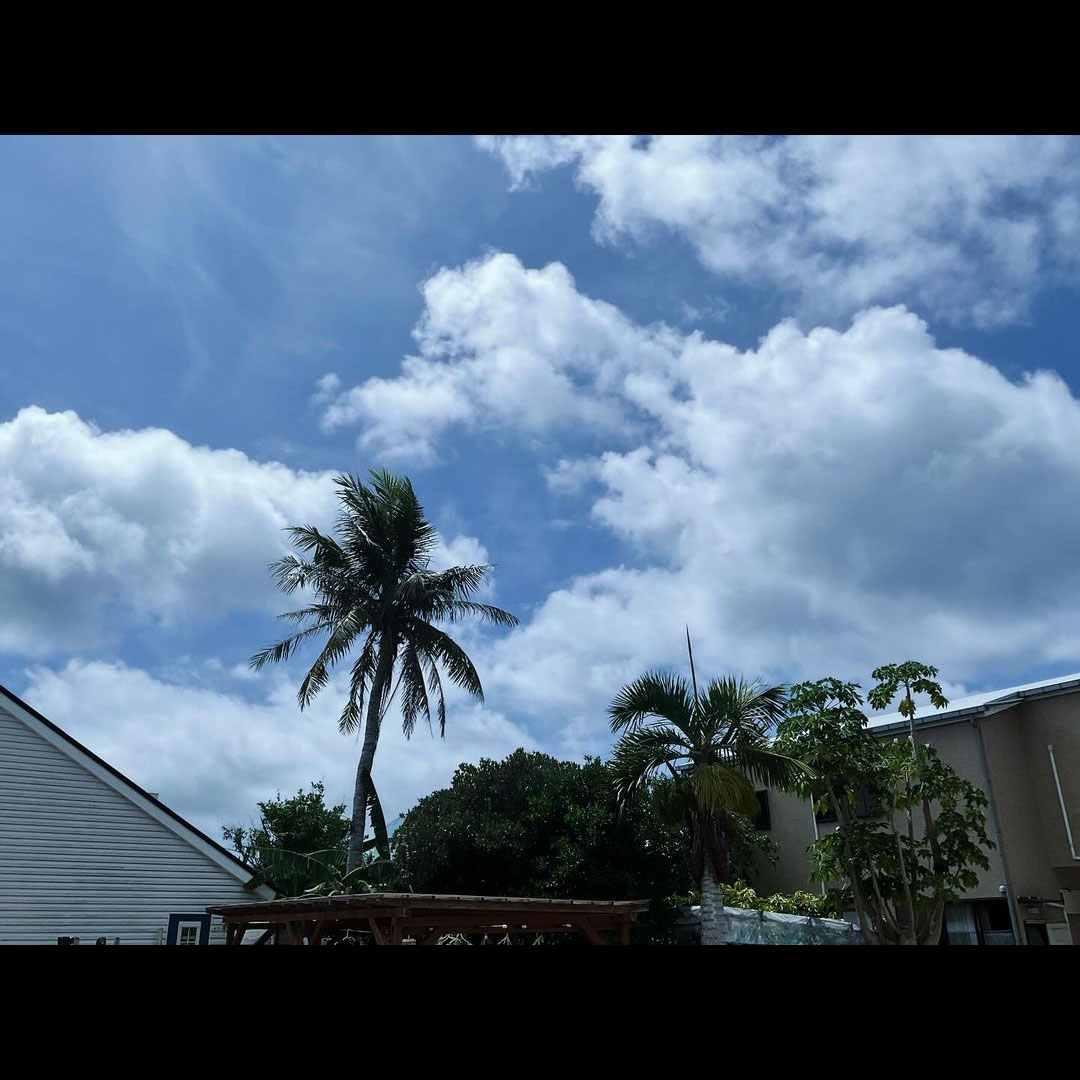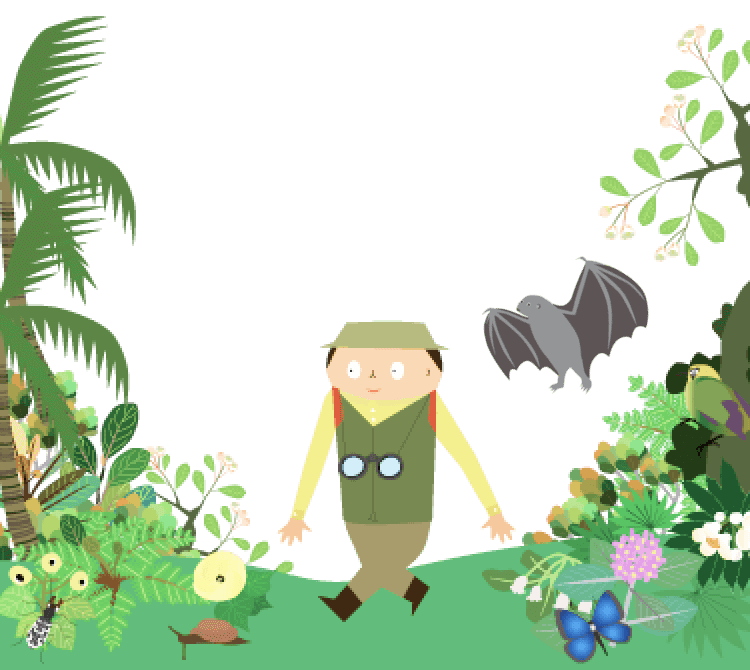Measures against non-native species
The Ogasawara Islands have never been connected to the continent, and animals and plants inhabiting the islands constitute a very susceptible ecosystem. Currently, the number of endemic species found only in Ogasawara is decreasing as non-native species prey on them and/or take over their habitats.
In order not to bring in non-native species that may adversely affect the ecosystem of the Ogasawara Islands, it is necessary for each visitor to be cautious.
When boarding the Ogasawara Maru from the mainland and on the Hahajima Maru from Chichijima Island, and during your stay on the island, we appreciate your cooperation in the following matters.
*If you are going to an uninhabited island such as Minamijima Island for guided tours or diving, please see “During your stay in Chichijima and Hahajima Islands”.
Boarding the Ogasawara Maru from the mainland
Passengers on the Ogasawara Maru are advised not to bring plants, animals, soil, or any goods with soil attached to them on board.
◆Check your luggage
Items which may be non-native species or have non-native species possibly mixed in are the following. It is best not to bring them onto the Ogasawara Islands, but if you need to bring them in, please handle with care.
1) Pets such as animals, insects, and tropical fish
If pets run away, they may adversely affect the nature of Ogasawara, like attacking native species on the islands.
In April 2021, the Ogasawara Village Ordinance of Proper Husbandry and Management of Pet Animals was enacted (commonly known as the Pet Ordinance). Please be sure to refer to it if you plan to take a pet.
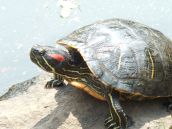
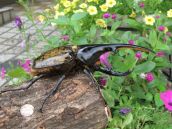
More!
2)Plants such as potted plants, seedlings, seeds, and flowers
The plants themselves may become a non-native species, or an non-native species may be mixed in the pot or on the leaves.
Check for insects and/or plant seeds in the soil and on the leaves, please remove them when found.
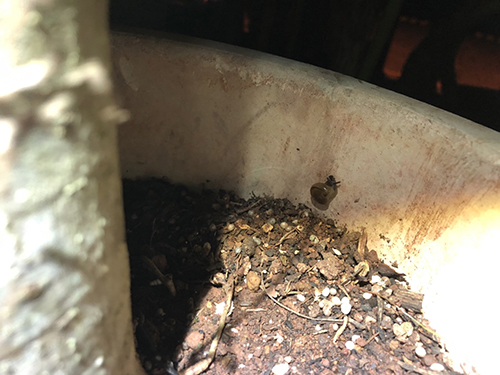
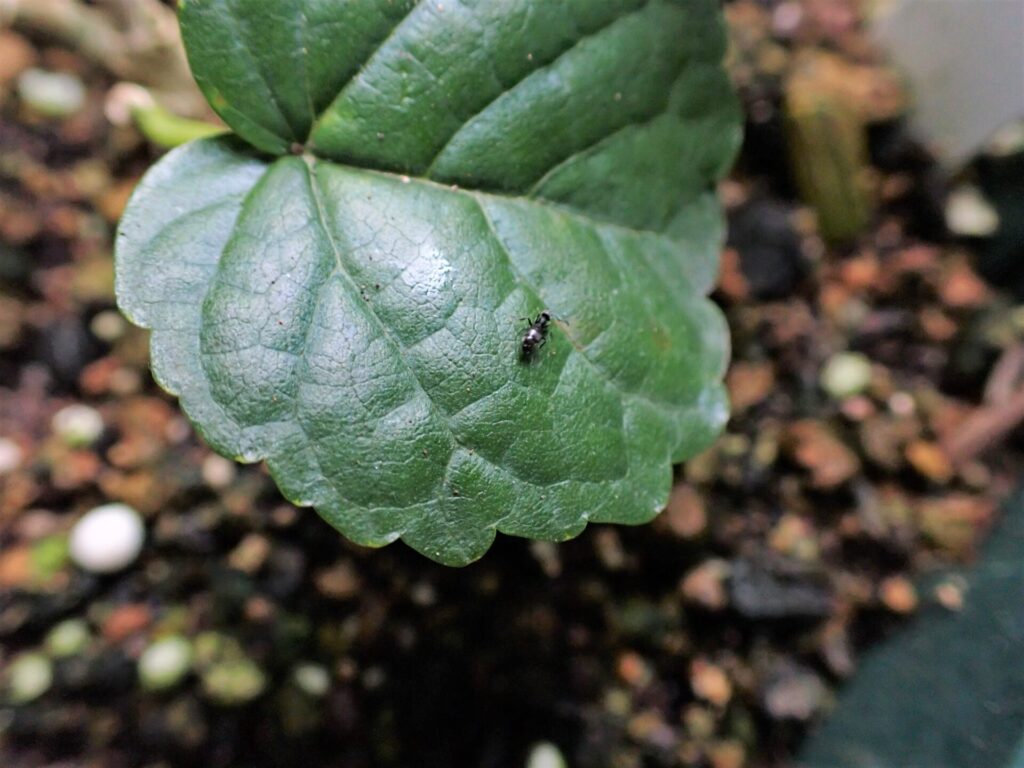
3) Other items particularly made from wood, and vehicles and cargo to which soil can easily become attached
Wooden objects and vehicles are items to which soil can become attached easily, and non-native species may be attached to those items.
Check for insects and/or plant seeds on the items and please remove them if found.
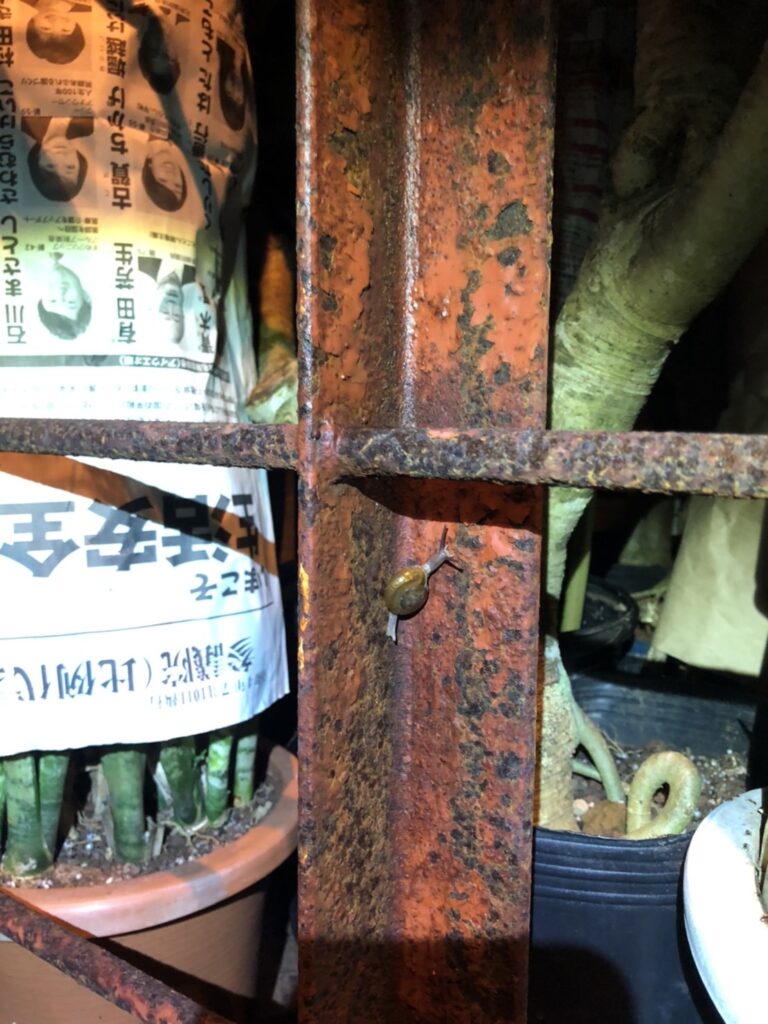
◆Cleaning of shoe soles
At the Takeshiba passenger ship terminal and the port of Chichijima, brush mats have been placed to remove soil from shoe soles to prevent the introduction of the predatory flatworm and new non-native species.
We appreciate your cooperation in cleaning your shoe soles when boarding and disembarking.
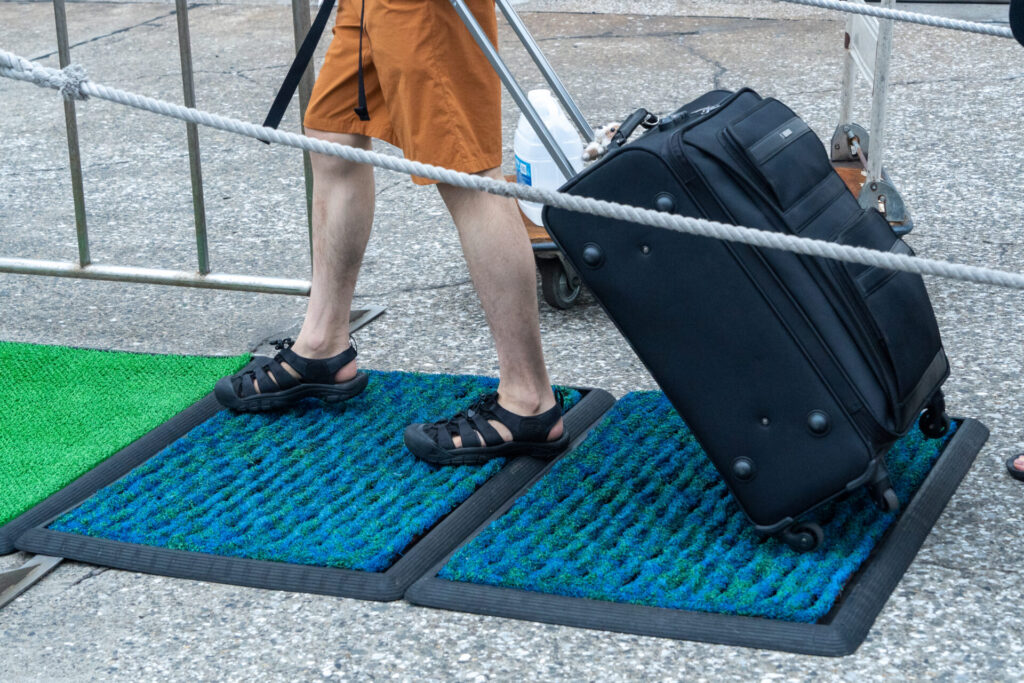
When boarding the Hahajima Maru from Chichijima Island
On Chichijima Island, endemic land snails are on the verge of extinction because predatory flatworms prey on them.
Since these flatworms have not yet been brought to Hahajima Island and many endemic land snails remain, it is important not to transfer them when going to Hahajima Island from Chichijima Island.
◆Check your luggage
As mentioned above, please check your luggage when boarding the Hahajima Maru.
Especially items such as shoes and tripods used in Chichijima Island to which soil may become attached need to be thoroughly checked.
◆Hot bathing of soil-attached seedlings
In FY2020, the Ministry of the Environment started provisional use of Haha-no-Yu (Hahajima hot-bathing facility) to prevent the introduction of non-native species onto Hahajima Island with the soil-attached seedlings/potted plants.
Please read the following and contact the Ministry of the Environment in advance if you plan to bring soil-attached seedlings/potted plants to Hahajima Island.
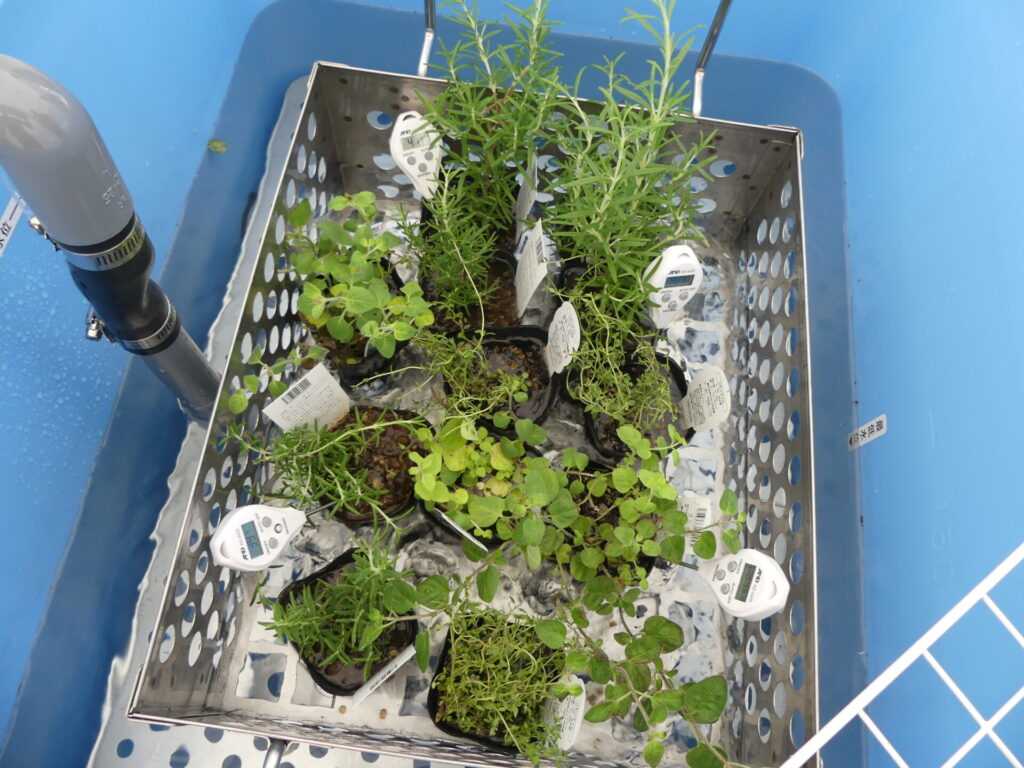
◆Cleaning of shoe soles
At the ports of Chichijima and Hahajima Islands, brush mats are installed for removing mud from shoe soles to prevent the introduction of predatory flatworms and new non-native species.
We appreciate your cooperation by cleaning your shoe soles when boarding and disembarking the Hahajima Maru.
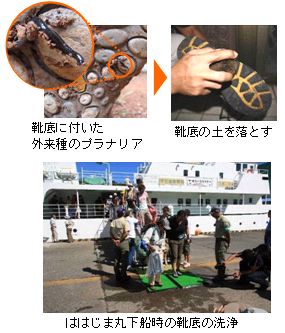
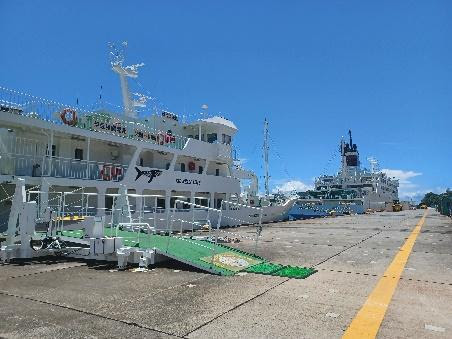
During your stay on Chichijima and Hahajima Islands
On Chichijima and Hahajima Islands, special measures have been taken to prevent the spread of non-native species to mountainous areas and other islands.
◆Check your luggage, clothes, and shoes
At the entry points of trails on Chichijima and Hahajima Islands, sticky rollers and brush mats (non-native species removal devices) are placed to remove small insects, seeds, and soil that may be attached to shoe soles, clothes, and other belongings.
Check your clothes, shoes, and backpacks for insects and plant seeds, and use the removal devices to clean off any soil.
When going to uninhabited islands such as Minamijima Island for guided tours or diving, please check thoroughly for green anoles hiding in your belongings.
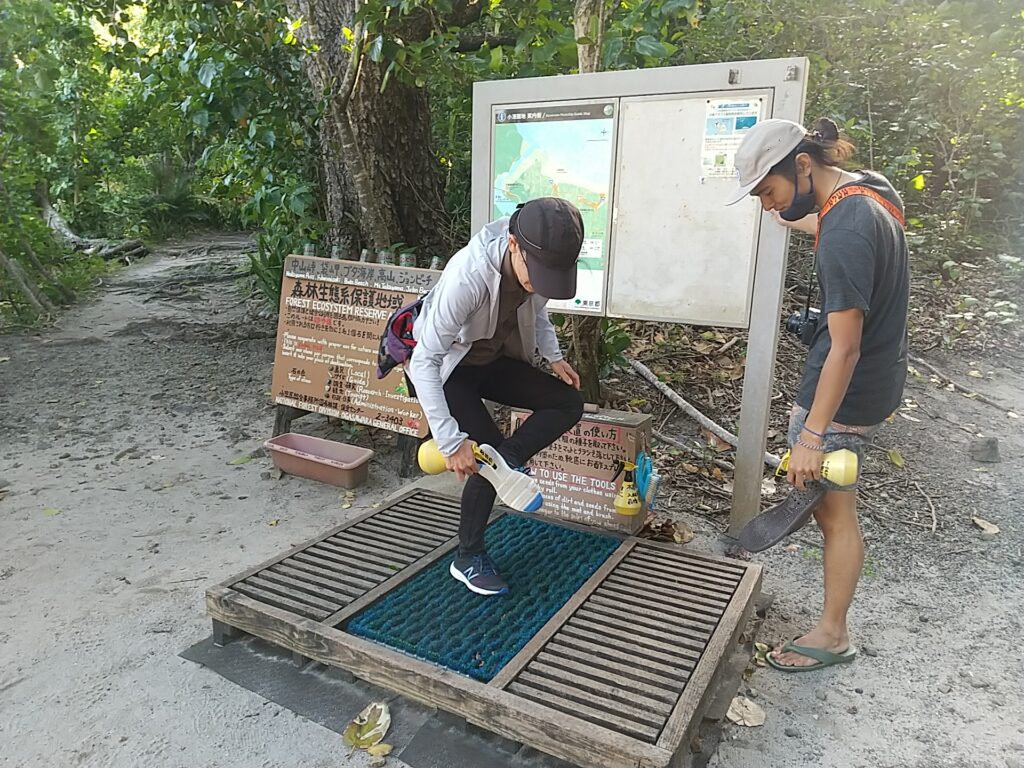
◆When finding non-native species
Wildlife could possibly carry infectious diseases. In addition, most parts of the Ogasawara Islands are designated as a national park, and there are areas where the capture and collection of animals and plants are prohibited.
If you find unfamiliar animals and plants, please do not touch them, and contact the Ministry of the Environment.
Furthermore, if you find unfamiliar species hiding in purchased items (i.e., food, clothes, furniture, etc…), put them into a sealable bag and incinerate them in order to prevent them from spreading.
Contacts
Chichijima Island: Ogasawara Ranger Office for Conservation +81-4998-2-7174
Hahajima Island: Hahajima Ranger Office for Conservation +81-4998-3-2577
